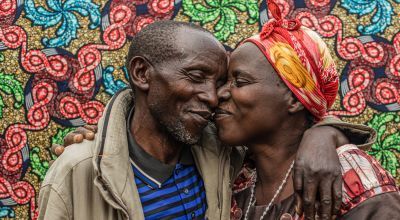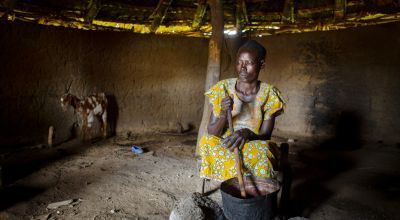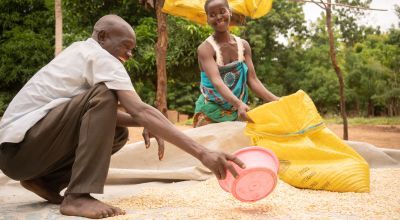
Read our 2023 annual report

Knowledge Hub
As of 2020, the United Nations ranks Sierra Leone 155 out of 162 countries for gender equality.
The UNDP’s Gender Inequality Index tracks several indicators for equality, including education, adolescent birth rates, and maternal mortality rates. With gender equality important for ending poverty, these three issues are at the heart of Concern’s work in the country. Here’s what we know about the state of gender equality in Sierra Leone in 2022, and what we’re doing in the country to further equality for all.
Gender equality in Sierra Leone: By the numbers
- 1,120 out of 100,000 Sierra Leonean women are expected to die due to complications from pregnancy or childbirth
- For every 1,000 girls in Sierra Leone, 112 will become mothers between ages 15 and 19
- Women hold 12.3% of seats in Sierra Leone’s Parliament
- 33% of men in Sierra Leone have reached at least a secondary education; only 20.1% of women will do the same
- 61% of women in the Sierra Leone will experience gender-based violence (GBV) in their lifetime
- 62% of women in Sierra Leone have reported experiencing violence over the last 12 months, a number UNFPA estimates was exacerbated by COVID-related lockdowns
- 30% of girls in Sierra Leone were married before their 18th birthday; 13% before their 15th birthday
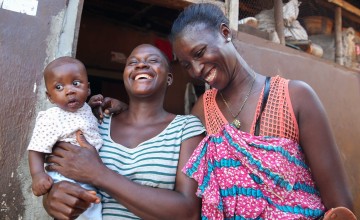
What challenges do women and girls face in Sierra Leone?
Despite having overcome a civil war and the world’s largest Ebola epidemic, Sierra Leone still faces many development challenges. This is especially true for the women who live in the country, as their rights are undervalued compared to men.
Gender-based violence in Sierra Leone
It was only in 2007 that Sierra Leone's Parliament passed the first laws regarding gender equality, nearly half a century after gaining independence from the United Kingdom. Fifteen years later, GBV was still considered a taboo topic. However, following the assault of a five-year-old girl in Freetown and the revelation that GBV cases had nearly doubled in one year (with 70% of survivors being children under 15), activists began calling for greater change. At the forefront of this movement has been Asmaa James, a journalist who was among the first to cover GBV in the press and whose foundation launched the Black Tuesday movement. Also involved is Sierra Leone’s first lady, Fatima Maada Bio, who has spearheaded the campaign “Hands off Our Girls.”
In 2019, Sierra Leone’s president, Julius Maada Bio, declared a “state of emergency” with regards to GBV. “Some of our families practise a culture of silence and indifference towards sexual violence, leaving victims even more traumatised,” he said in a speech from February of that year. “We as a nation must stand up and address this scourge.” This state of emergency later gave way to legislative reform that was passed in Parliament seven months later. An amendment to the 2012 Sexual Offences Act, it increased minimum sentences for rape charges, codified offenses for assaults by people in authority roles (including teachers and doctors), and criminalised attempts to settle GBV cases without reporting them to local authorities.

“Some of our families practise a culture of silence and indifference towards sexual violence, leaving victims even more traumatised.”
Living Peace to end GBV
One of the core facets of our work towards gender parity at Concern is our Engaging Men programme, which enlists men and boys as allies for gender equality. Some of the greatest success with Engaging Men has been seen in Sierra Leone, where early results indicated a potential link between this gender-transformative intervention and improved psychosocial, health, financial, and even educational outcomes. As one elder put it: “If you have one agreement — unity — there will be development in the home.”
Living Peace groups in Sierra Leone, which provide psychosocial support and education in post-conflict settings, were part of our Engaging Men approach there, and took things further by creating farms where participants could continue to share knowledge and maintain the community of their group. Village chiefs in particular embraced these groups, as they had the added effect of resolving community conflicts.
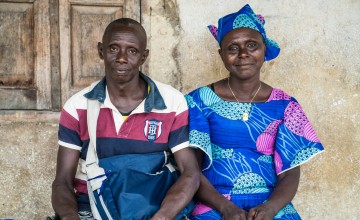
School-related GBV in Sierra Leone
Another way Concern has been responding to the epidemic of gender-based violence in Sierra Leone is with the Safe Learning Model. School-related gender-based violence (SRGBV), corporal punishment, and sexual abuse are all ways of diminishing a child’s wellbeing, while also negatively affecting their learning. This is especially true for girls.
Funded by Irish Aid, our pioneering multi-million euro, five-year pilot program is the first ever large-scale research project to explore the link between SRGBV and literacy in 55 schools across 55 communities. Students who have participated in the Safe Learning Model have performed better on literacy milestones than those who have not participated.
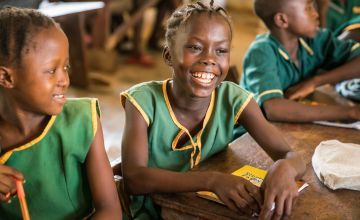
Girls’ education in Sierra Leone
In addition to addressing GBV, the Safe Learning Model addresses another key area for gender equality in Sierra Leone: education. Earlier this year in Freetown, education ministers from 13 African countries (including, of course, Sierra Leone) held a three-day, high-level meeting to address the systemic barriers that prevent children of all genders from receiving an education — and more than just that.
“Let us go beyond gender parity in accessing education. Let us make sure that the full rewards of education are also enjoyed equally,” said Sierra Leone’s Minister of Basic and Senior Secondary Education, Dr. David Moinina Senegh. “Let us make sure that we lay the foundation for societies with equality before the law, equal representation, equal pay for equal work, and equal opportunity regardless of your gender, physical ability, the size of your bank account or the location of your home.”
As Dr. Senegh suggests, education is both a right that should be equally accessed, but also a tool for even greater equality (gender and otherwise). Sierra Leone made a large step towards its own equality in education this year by overturning a ban that prevented pregnant girls from attending school. In 2015, Concern also called on the Government of Sierra Leone to overturn this discriminatory law by putting certain provisions in place, including stronger reporting, referral, and support systems in schools and communities so that pregnant girls and adolescent mothers can receive the physical and emotional care they need, as well as the means to report acts of violence against them.
Seven years — and much lobbying from other organisations and activists — later, the government has responded. “It’s such a significant step forward for Sierra Leone and a very brave thing for the Government to be prioritising,” said Concern Worldwide's Senior Education Adviser Amy Folan. “If pregnant girls can still access school, they can still benefit from all the possibilities obtainable with a good education and there are so many benefits. Not just for the girls themselves, but for society overall.”
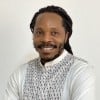
“Let us go beyond gender parity in accessing education. Let us make sure that the full rewards of education are also enjoyed equally.”
Sex education in Sierra Leone
One component under the Safe Learning Model is Adolescent Sexual Reproductive Health (ASRH). This element aims to reduce teenage pregnancy amongst adolescents aged 9 to 19 years through increased awareness of and access to, better sexual and reproductive health information and services in order to exercise their sexual and reproductive health rights.
To achieve this, the project adopts a behaviour change approach amongst boys and girls to address the underlying attitudes that drive teenage pregnancy. It further utilises a socio-ecological model to engage parents, teachers and the wider community to create an enabling environment, including healthcare workers (who have a vital role to play in the provision of services).
Our approach, which includes components from Living Peace, is focused on changing the context around the adolescent and then giving them the skills to think critically and to understand their rights simultaneously; increasing the opportunity to claim these rights and exercise decision-making. By improving the communication between adolescents and parents on ‘day-to-day’ topics such as sex, marriage, and relationships, communities themselves have been able to identify the key drivers of teenage pregnancy through a participatory approach in order to find appropriate solutions.
“We have never spoken about sex and menstruation to our children; we thought it was a taboo to talk about this to them and especially when we thought they were yet children and have to reach the stage to have sex. Today, Concern, through the ASRH project has helped us to talk about this to our children. At last, the silence has been broken!”
EAGER for the future
Building on the success of ARSH and funded by the Department for International Development, Concern has launched its next development in girls’ education in Sierra Leone, Every Adolescent Girl Empowered and Resilient (EAGER). Managed in consortium with International Rescue Committee, Restless Development, and BBC Media Action, the programme aims to improve literacy and numeracy, build life and business skills, and provide psychosocial support for out-of-school and marginalised adolescent girls.
In addition to teaching girls how to read and write, workshops focused on life skills, social-emotional learning, and the sorts of business skills that they could use to set up their own small businesses or secure livelihoods. In doing this, we found opportunities to challenge the harmful socio-cultural gender norms and prompt a shift in gender attitudes and practices among some of the most at-risk communities in Freetown, Port Loko, and Tonkolili.
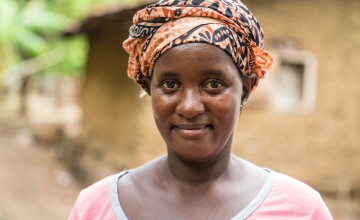
Gender inequality and hunger
As we’ve seen with some of the programmes mentioned above, gender equality is an intersectional issue that needs intersectional solutions. Another project designed to address some of these intersections has been our ongoing Linking Agriculture, Natural Resource Management, and Nutrition (LANN).
In partnership with Welthungerhilfe, LANN centres on a participatory nutrition education approach, wherein vulnerable households and communities are mobilised to engage in positive behaviour change around dietary diversity, infant and young child feeding, hygiene and sanitation, and natural resource management. This is complemented by activities in nutrition-sensitive agriculture (and income generation), WASH, and natural resource management. Project activities include sessions on engaging men, sharing of responsibilities and cooking classes for men, as well as sessions on land rights and natural resource management for women.
As a result, women have key responsibilities in community structures, such as committees and Village Savings and Loans Associations (VSLAs). Men, likewise, have become more involved in the unpaid domestic labour that often falls to women, including building cooking huts, maintaining vegetable gardens, and doing the laundry.
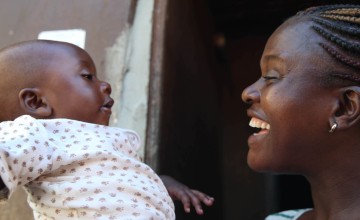
Making maternal and child mortality a thing of the past
By 2010, the number of children who died before their fifth birthday had declined by nearly half compared to 1990 (12 million to 7.6 million). However, this decline was not consistent in every country, and Sierra Leone has consistently topped the list of highest maternal and child mortality rates. In 2010, 160 out of every 1,000 children born didn’t reach the age of 5 (more than three times the global average). The numbers were equally distressing for infants: One in ten wouldn’t make it to their first birthday.
Concern launched Al Pikin fo Liv (“Every Child Must Live”) in ten of the informal settlements of Freetown, the capital of Sierra Leone in 2011, as part of our larger work with USAID and Child Survival. Al Pikin fo Liv was developed to reduce maternal, infant, and child morbidity and mortality rates by improving knowledge of health and healthy habits in families; strengthening the quality of care offered at healthcare facilities; Building the capacity to plan, implement, and monitor health initiatives at the community level; contributing to improvements in health policy at the national level.
While the 2014-16 West African Ebola epidemic interrupted some of this work, we still saw the effects of Al Pikin fo Liv lead to the lowering of morbidity and mortality rates for over 36,000 women and 35,000 children under 5 across 10 communities in Freetown. This success was also reflected in overall trends: By the end of 2017, countrywide mortality rates for Sierra Leonean children under 5 had dropped from 16% to under 12%. The country is no longer the highest for mortality rates, and its numbers continue to drop year over year. Communities in Freetown took over the management of Al Pikin fo Liv following the end of our project in 2017.


